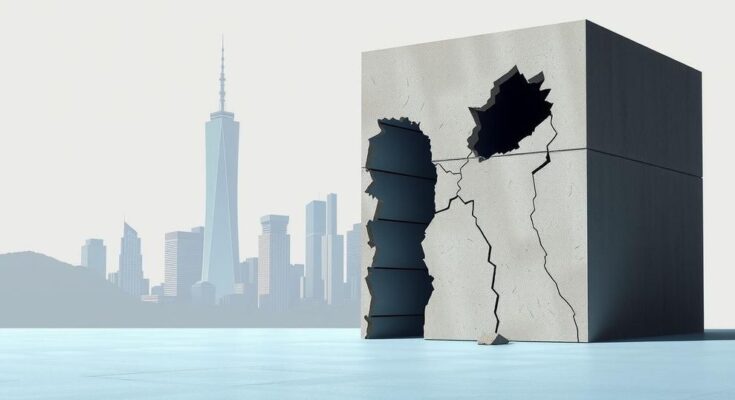Iran’s economy is in crisis due to soaring inflation and currency devaluation, largely attributed to U.S. sanctions reinstated by President Trump. Essential costs are skyrocketing, and nearly half the population lives in poverty. As frustrations grow, the Iranian government faces critical choices to address the exacerbated situation.
Iran’s economy is experiencing a severe downturn, characterized by rampant inflation, a devalued currency, and escalating poverty that has affected millions of citizens. The situation has worsened since U.S. President Donald Trump reinstated the “maximum pressure” campaign, which has intensified sanctions aimed at crippling Tehran’s economy. The repercussions of these sanctions are being felt deeply across Iran as the government struggles to cope with the adverse effects.
Essential commodities such as food and housing have become prohibitively expensive, forcing many Iranians into hardship. Current inflation rates have soared above 45 percent, with nearly half of the Iranian population living in poverty, as reported by the Statistical Centre of Iran. The mounting frustration among citizens is putting increasing pressure on the leadership to take action in response to these challenges.
Under President Trump’s directives, the United States has reinstated sanctions that are intended to undermine Iran’s economy, with noticeable impacts already emerging. While Trump has indicated a willingness to engage in negotiations, he has simultaneously threatened to escalate pressure on Tehran concerning its advancing nuclear program.
Iran’s currency has plummeted to an unprecedented low of 928,000 rials per dollar, which marks a 6 percent decline from the previous trading day. This significant currency devaluation has led to heightened inflation, eroding savings, and making imported goods unaffordable for many Iranians, which has further exacerbated the economic crisis.
The housing market in Tehran reflects the economic turmoil, with rents having risen 24-fold over the past dozen years, while property prices have increased by more than 37 times. In contrast, wages have only seen a 20-fold increase, rendering the prospect of securing a modest apartment unattainable for many, especially as rents in certain areas now exceed an average worker’s monthly salary.
The sanctions imposed on Iran’s vital oil sector are particularly detrimental, given that oil sales constitute nearly half of the government’s revenue. Trump recently reissued the strategy from his first term, aiming to reduce Iran’s oil exports to zero, deepening the country’s economic crisis. “Iran’s oil revenues have been able to paper over many of the structural faults in the economy,” noted Afshin Molavi, a Senior Fellow at the Foreign Policy Institute.
As President Trump remains open to negotiations, he has firmly cautioned, “They cannot have one thing—they cannot have a nuclear weapon. And if I believe they are pursuing one… it will be very unfortunate for them.” The situation in Iran continues to develop, leaving many citizens anxious about what the future holds.
Iranian President Masoud Pezeshkian has remarked, “The current economic challenges are beyond the government’s immediate control, and we are exploring all possible avenues to mitigate the impact on our citizens.” Meanwhile, Trump claimed, “Iran is very nervous. I think they’re scared. I think Iran would love to make a deal and I would love to make a deal with them without bombing them.”
Afshin Molavi further stated, “This is a crisis mostly of its own making. Years of mismanagement, corruption and poor policy decisions have led to the massive underperformance of an economy that should be a major regional powerhouse.” As the economy deteriorates, the Iranian government faces critical decisions regarding diplomacy, reform, or confrontation with the United States, amidst cries from its citizens for relief.
In conclusion, Iran’s economy is enduring a significant crisis, intensified by U.S. sanctions reinstated by President Trump. The effects of these sanctions have resulted in soaring inflation, a collapsing currency, and widespread poverty among Iranians. As the government grapples with these challenges, increasing pressure mounts for potential reforms or diplomatic engagements to alleviate the dire situation facing millions of citizens.
Original Source: www.newsweek.com




